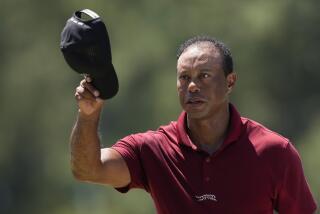Tiger Woods still has major questions

- Share via
GULLANE, Scotland — It is only golf, but Tiger Woods continues to stir emotions like religion or war, which are often the same thing.
He may be the most polarizing sports figure since Muhammad Ali during the Vietnam War.
Love Tiger or hate him, millions crave information about him.
Tennis had John McEnroe, but the lines on both sides of his popularity fence were nowhere near as long as Tiger’s. Boxing’s Floyd Mayweather Jr.? We know much of his spiel is contrived to promote his fights. The NFL’s Ray Lewis? We have our suspicions, but we really don’t know enough. How about North Korea’s Dennis Rodman? How upset can you get about tattoos and a classic con job?
Baseball had Manny Ramirez. Still might. But more than serious emotion, he stirs wrinkled brows and giggles.
Speaking of Manny, it is British Open week here, and Tuesday morning, Tiger was being Tiger.
The call to arms emptied the press room and made the interview theater SRO. Like cattle to a trough, we come with renewed thirst.
Moo. Moo.
We have departed to cross the Pond carrying versions of the same question, asked by just about anybody who knew we were going. It is as if the impression left is that our press credential automatically comes with a secret insight into Tiger’s swing thoughts.
Can he win? Will he win? If he wins, how many more majors will he win? Can he break Jack Nicklaus’ record, or is that now a pipe dream? Is he too old at 37?
The answer remains the same. We have no clue. Nobody does.
For Eldrick “Tiger” Woods, born and raised in Cypress, now a resident of Jupiter, Fla., and possessor of the second-most major golf titles in history with 14, four shy of Nicklaus, the main story line has changed little in five years.
He hasn’t won a Grand Slam golf event since he limped those 19 U.S. Open playoff holes at Torrey Pines in 2008 to beat a nice guy, but a non-formidable challenger, in Rocco Mediate.
Since then, he has changed his swing, although you need to be Butch Harmon or a computer to see the difference. He stumbled around in 2010 with no victories, managed just one in ’11 at his own World Challenge event at Sherwood in Thousand Oaks, and stopped being his usual No. 1 in the world. Then he came back last year with three victories and already has four more this year.
Guess who is No. 1 again?
The sticking point, of course, is that there have been no more majors. He plays to win tournaments and lives to win majors. As ridiculous as it may seem, even with seven wins in the last two years and a return to No. 1, failure at the majors remains the sticking point.
“Even though I haven’t won a major championship in five years,” he said, “I’ve been there in a bunch of them where I’ve had chances. I just need to keep putting myself there and eventually I’ll get some.”
Notice he said “some,” not another one.
All of this comes against the background of his marital infidelity in 2009. The subject doesn’t ever quite go away because as long as he fails to win another major, it seems tied to that. That was the beginning of the great polarization. Huge groups of Tiger fans, many of them female, became Tiger haters. The once heavily franchised Tiger Nation felt lied to and disenfranchised.
Then, there was the incident at this year’s Masters, where he took an illegal drop and clearly didn’t know what he had done, because he brought it up himself in a TV interview. Masters officials fumbled on the ruling procedures and tried to play catch-up by assessing a two-stroke penalty, but no disqualification. Suspicion was that anybody else but Tiger would have been gone.
The grumbling in the players’ locker room reflected a sentiment that, in golf, once you sign an incorrect scorecard, even when you didn’t know it was incorrect, you must be disqualified or disqualify yourself. Woods had signed and did not disqualify himself.
That brought more anti-Tiger sentiment, as well as sentiment that golf’s purism is stupid and it would have been silly to overrule the officials who had ruled.
Like his infidelity, the Masters controversy won’t go away. The editor of Golf Digest, Jerry Tarde, wrote a tongue-in-cheek essay in the magazine’s British Open preview edition titled “Tiger’s Mulligan.” His lead sentence: “Tiger did the right thing.”
Tarde’s point, cloaked in creative sarcasm about how disqualifying himself had rehabilitated his image, was exactly the opposite. By not disqualifying himself, Tiger did the wrong thing.
As usual, the side issues were dealt with Tuesday. Woods said his injured elbow has healed. He said Muirfeld’s course is set up beautifully and is very fast and firm with the absence of rain. He spoke with reverence about an afternoon years ago that he spent with South African legend Nelson Mandela. And he blew off the ever-present question about Muirfeld’s male-only membership.
“I don’t make the policies here,” he said.
Then he was gone. Time to practice. Another try at a major beckoned.
That will be watched closely and documented fully.
Moo. Moo.
More to Read
Go beyond the scoreboard
Get the latest on L.A.'s teams in the daily Sports Report newsletter.
You may occasionally receive promotional content from the Los Angeles Times.











